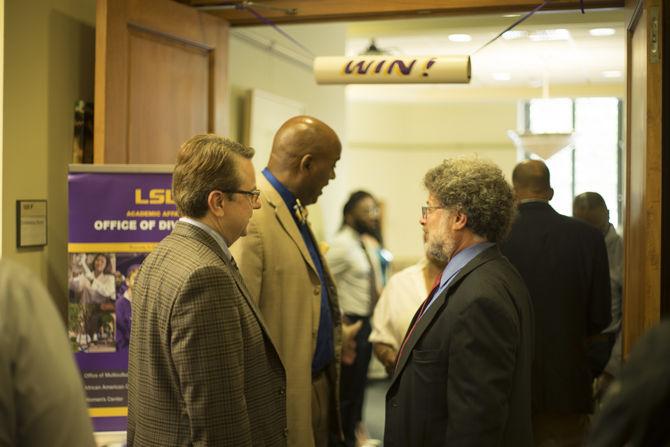In its annual open house on Wednesday, the Office of Diversity opened its doors to students and faculty to discuss and promote campus diversity.
Students were able to learn about programs the Office of Diversity has to offer, including events at the Women’s Center, African American Cultural Center and Office of Multicultural Affairs.
The Office of Diversity aims to make the University comfortable for all by celebrating diversity with its motto “Diversity is good for everyone.” If students haven’t learned to live, play and study with those of different backgrounds in college, they won’t be prepared for a diverse workplace, Vice Provost for Diversity Dereck Rovaris said.
“If you come to LSU and you leave this place and you don’t have an understanding about diversity, then we’ve failed,” he said.
Although the University saw a “slight tick” in overall enrollment, diversity continues improving every year, LSU President F. King Alexander said. This incoming freshman class is the largest African-American class in the University’s history and the largest Hispanic entering class.
“In the next lifetime, many of our graduates are going to be working in a world that looks like the United Nations,” Alexander said. “I think part of the educational process is ensuring that our students know what the world is going to be like.”
University administration is working to close the gap between marginalized and minority students and the white student population, Alexander said. Students are more likely to respect each other when they know each other and interact together, he said.
In not fostering a diverse learning environment, students are ill-equipped to enter the real world at the fault of the University, Alexander said.
Baton Rouge had a tumultuous summer, including budget cuts, the shootings of Alton Sterling and three police officers and the August flooding. With the start of the semester and return to routine, the effects of these events can become an afterthought in people’s minds.
“We get on with life, and that’s good, because it is a sense of normalcy for many of those that are affected,” Rovaris said. “But, we always have to remember those that are still hurting.”
Rovaris said he thought many were forgetting about the racial tension in the community, until the shootings of Keith Scott in North Carolina on Tuesday and Terence Crutcher in Oklahoma on Friday, both African-American men.
“There seems to be this pervasive interaction of police officers and African Americans, particularly males, that ends in death. That is just not acceptable,” Rovaris said.
Alexander said access to education could have prevented Sterling from ever being in the situation in the first place, blaming the opportunities he didn’t have for his death. Not acknowledging the tragedy and its aftermath means the conflict may never be resolved.
The Office of Diversity sponsored a community meeting regarding the protests following the Sterling shooting.
As part of continuing conversation, the University will host a presidential symposium, “Moment or Movement? A National Dialogue on Identity, Empowerment, and Justice for All” on Oct. 3 and Oct. 4.
The symposium will examine the summer events and their effects.
Practicing an open dialogue and addressing student concerns about the shooting will be vital as decisions regarding those involved are made, Rovaris said.
Office of Diversity holds annual open house
September 21, 2016
Faculty members chat during the Office of Diversity open house on Sept. 21, 2016 in Thomas Boyd Hall.
More to Discover






